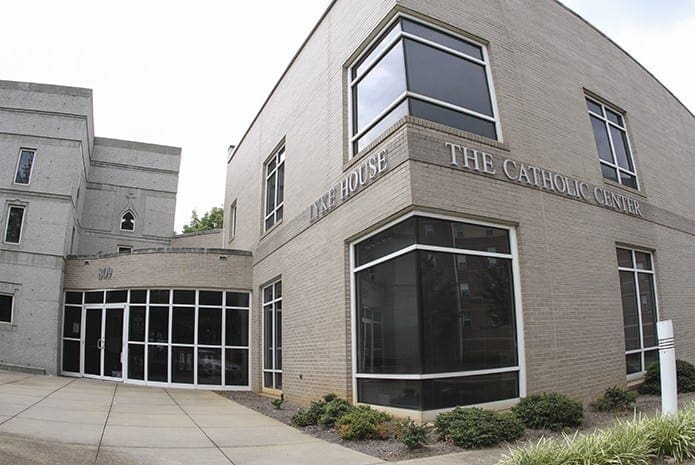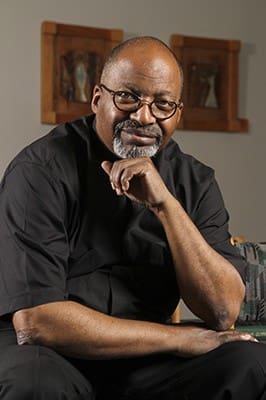 Photo By Michael Alexander
Photo By Michael AlexanderAtlanta
A priest for 41 years, Msgr. Branch wants to turn his attention to the poor
By ANDREW NELSON, Staff writer | Published August 6, 2015
ATLANTA—Msgr. Edward Branch has stepped aside from his longtime ministry at the Atlanta University Center, the campus of four historically black colleges and universities, and is “refocusing” his ministry.
A priest for more than 40 years, he wants his next chapter in life to be about the poor and the marginalized. He envisions serving with Catholic Relief Services and the Catholic Campaign for Human Development, where the approach is the empowerment of poor people.
“Jesus is an empowerment person,” Msgr. Branch said.
Growing up in a home with Catholic values
Msgr. Branch, who is 70, is settling into a condominium where he will live in Atlanta’s Castleberry Hill neighborhood. He talked about organizing a party to get people to move his scores of books now in boxes into what will be his office.
In his living room overlooking the construction site of the new Atlanta Falcons stadium he talked about growing up in 1950s Washington, D.C.
His family’s neighborhood was near Howard University. His father, Wadsworth, had left New Orleans for the nation’s capital where there were more job opportunities for blacks. He worked for two federal agencies, ending at the Internal Revenue Service. His mother, Christine, once the children were older, was on the administrative staff in the public schools. His parents set an example of living faith.
“Our next door neighbor joked one day that even the air in our house was Catholic. I know what she meant now,” he said. “We didn’t have these rosaries hanging around. There were these values, and we kept them. Everybody went to Mass on Sunday every time. Fast days and holy days of obligation, we did all those.”
However, the remains of Jim Crow touched his life still. The Branch family, with six children, was not welcomed to attend the parish of St. Martin of Tours just blocks away because they were black. They instead attended St. Augustine Church, the oldest black Catholic parish in the archdiocese. His brother later would be the first black altar boy at St. Martin.
He attended Catholic school, where in sixth grade the idea took root of being a priest. Msgr. Branch credits religious sisters for shaping his faith.
“They were bound and determined” to instill in their students a good education and a good knowledge of the faith, he said. At the same time, Catholic life extended from the church and the parish school into the community. It was common to have priests visit his home.
“They were clearly champions of us, black Catholics. They were clearly on our side,” he said. Msgr. Branch and his brother, Leslie, later would become priests. Father Leslie served as the first black Catholic chaplain in the U.S. Navy.
As a youngster, he delivered the newspaper. His route took him to the Catholic University of America where, among the religious communities, he found the Xaverian Brothers, a teaching order. A high school class convinced him he wasn’t smart enough to be a priest. Latin tripped him up. The Xaverian Brothers appealed to him, though. His family valued education. His relatives were teachers. He knew he could make a difference in the community by serving in a classroom.
Right out of high school he was the only black brother in the Xaverian class of novices. He said it was the height of the civil rights movement and he and his brothers would be desegregating parishes in southern Maryland without him knowing it.
“I joined the brothers and that’s the best thing I could have possibly done in life,” he said.
Several years after joining the community, the desire for the priesthood reemerged, and he left to attend the seminary. He remains attached to the Xaverian Brothers to this day and he attends reunions.
He became a priest for the Archdiocese of Louisville, Kentucky, where he was teaching secondary education at the time. After ordination in 1974, he returned to Washington, D.C, where he celebrated his first Mass in the church where his family once was not welcome.
“God always writes straight with crooked lines,” he said.
A priesthood devoted to students
Grambling State University in Louisiana and Catholic University of America in Washington, D.C., were campuses where he served students on their faith journey.
Indeed, Msgr. Branch has a knack for that role.
“He meets people where they are and brings them to where God wants them to be through genuine love,” said Ansel Augustine, the director of the Office of Black Catholic Ministry for the Archdiocese of New Orleans.
Augustine met Msgr. Branch at the University of Notre Dame, where he taught in the Institute of Black Catholic Studies. During the summer of 2006, the institute moved to the South Bend, Indiana, campus while its home at Xavier University, like the rest of New Orleans, was recovering from Hurricane Katrina’s devastation. Augustine said Msgr. Branch was a confidante for students and faculty from New Orleans to lean on. Augustine said Msgr. Branch’s ministry is about “being a companion on the journey, just like Jesus.”
In 1990, the Louisville priest came to the Atlanta Archdiocese at the request of Archbishop Eugene Marino, SSJ, to revive a Catholic presence at the historically black colleges and universities at the Atlanta University Center, including Morehouse and Spelman Colleges and Clark Atlanta University. He would be the first full-time Catholic chaplain there, where thousands of high-achieving black students from across the country came for higher education.

Msgr. Edward Branch retired in June after 25 years as the campus minister at Lyke House, the Catholic Center at the Atlanta University Center. He spent over 35 years of his priestly life in campus ministry. In addition to Lyke House he served at Grambling State University in Louisiana and Catholic University of America in Washington, D.C. Photo By Michael Alexander
Part of the mission included overseeing the construction of a permanent Catholic center. In 1991, he completed the doctorate program in ministry at Howard University School of Divinity in Washington, D.C.
Msgr. Branch said he thought he’d be here for only five years or so. Twenty-five years, it turned out to be. “Man proposes, God disposes,” he said with a smile.
His service would be recognized in 2013 in being named a chaplain of his holiness, with the title of monsignor. He became a priest of the Atlanta Archdiocese by incardination in 2010 along the way. Among other areas of service, he led his peers as president of the National Black Catholic Clergy Caucus. Msgr. Branch earned a reputation in the black Catholic community as a “down-to-earth, approachable priest,” Augustine said.
The AUC Catholic center at the time operated out of a duplex dubbed “the little blue house,” which was once a dress shop. The main room would be set up with 30 chairs and an altar for Sunday Mass.
Today the Catholic community on campus worships in a more than $2 million Catholic facility modeled after the stone churches of Ethiopia and named after late Atlanta Archbishop James P. Lyke, OFM. The Lyke House chapel seats 230 people; the building includes a daily Mass chapel, a library, conference and meeting rooms, a recreation area for students, and living quarters for a priest.
“I knew it was going to have to be a special place,” Msgr. Branch said. It was dedicated in 2000.
Campus ministry requires a certain touch. Msgr. Branch called it “loiter to a purpose.”
“You have to be the philosopher walking around. Sometime you have to be the hook-up guy. You are always hooking (students) up to some need they have, whether it’s a spiritual need, whether it’s an immediate need.”
He sees a university campus as a “mission territory” of students who are searching for a spiritual foundation, “a group that is not committed, but sniffing.”
Alexander Hamilton was one of those students. Now with degrees in law and other doctoral studies, Hamilton found then Father Branch on the sidewalk hanging out with students outside the old Catholic center. Hamilton was invited by the priest and other students to join their circle.
“After chatting with him for a spell, I noticed that the students had the same infectious personality as him. He cared little about my religiosity nor did he wear his religion on his sleeve. Christ was evidenced by his work. He only cared about me as a human being, what my goals were, and how I was going to reach them,” said Hamilton, who said he was a homeless student at the time who would wander into functions for food. He recently recently served for a time as the assistant dean of the Martin Luther King Jr. International Chapel at Morehouse College.
Hamilton isn’t Catholic. Religious membership was never a factor in relating to Msgr. Branch and the Catholic community, he said.
“The AUC Catholic Center was opened to all people and Msgr. Branch’s welcoming demeanor made the center a home away from home for many of us. There are countless of us ‘Branchites’ who have gone on to do magnificent things,” he said.
Alessandra B. Ennett-Shepard is a research scientist in the pharmaceutical industry now. She lives in Indianapolis after earning undergraduate degrees from Spelman College and Georgia Tech before her doctoral and post-doctoral studies. In 1991, she and then Father Branch were both “freshmen,” she as a student, he as the campus chaplain.
She called him a “father and teacher” to students, who cared about shaping students “into mature, responsible, hard-working, conscientious, pensive, willing-to-serve Christian adults.”
Lyke House, under his direction, gave students opportunities to move beyond the limits they set for themselves. University students mentored young people in elementary school. She recalled how they learned service by helping Archbishop Lyke, first by unpacking boxes to set up his home when he moved to Atlanta and later visiting him when he was hospitalized and sick.
From institution to community
At the AUC, the Catholic community may be all black, but it’s an international mix of experiences, with students from as many as a dozen countries, Msgr. Branch said. And with the diversity of backgrounds, Msgr. Branch empowered students to be responsible.
“If you don’t do it, nobody’s going to do it. It’s a model of church that is about community, not an institution. It makes you engage in ways you wouldn’t otherwise engage,” he said.
Campus ministry sometimes is given short attention, he said, but church leaders need to remember that is where church vocations are formed, whether in the priesthood or in married or single life. He said his mentoring played a part in half a dozen men becoming priests. Two are Father Desmond Drummer, serving in the Atlanta Archdiocese, and Father Christopher Rhodes, a priest of the Louisville Diocese.
Years after they left campus, the faith of former students continues to be shaped by the message Msgr. Branch shared.
“Anytime he opened his mouth, he was teaching and inviting us to think deeper about ourselves, our history, our community, our faith, our identity, who we were as African-American Catholic Christians and to be proud of that identity,” Ennett-Shepard said in an email.
Hamilton said the priest makes himself available to students and former students to this day.
“Mentors simply give advice. Sponsors open doors. This is what Msgr. Branch has been to me in my life,” he said.
“Throughout my travels, I could always count on Msgr. Branch to make a phone call and set up a new bridge for me to cross. In essence, he is a masterful bridge-builder whose work has allowed me to cross many a mighty river. Put simply, I would not be where I am today without Msgr. Branch.”